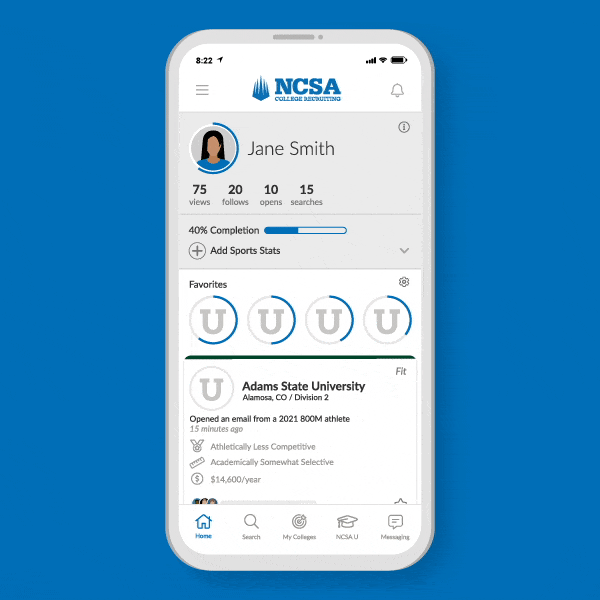5 Tips for College Recruiting Success

Are you dreaming of playing college sports but don’t know where to start? College recruiting may seem overwhelming, so we don’t blame you. Rest assured that the process doesn’t have to be as complicated as you might think.
College recruiting for student athletes is a multi-step process. And it may look a little different depending on your sport or level of competition.
The process starts with a student building a strong academic and athletic NCSA profile. Then, you can get a recruitment assessment to let coaches find your profile in their searches. Once your online presence is ready, you can start researching potential programs (if you haven’t already) and reaching out to college coaches.
Want a little more detail? Here are our top 5 college recruiting tips that you can use to increase your chances of landing an offer at a school you love.
How can I increase my chances of being recruited?
The best way to improve your chances of getting recruited is to focus on gaining exposure. Learn how to market yourself to coaches with an NCSA online profile showing off your talents, abilities, and skills. You can easily create an online presence as a student athlete, increasing the likelihood that coaches will find your profile and talk to you about their programs.
1. Research college athletic programs
One of our top college recruiting tips for success is to research different athletic programs before narrowing down your search too much. Look at different programs from colleges that interest you. When doing this research, pay attention to important information like:
- Team records
- Level of competition (i.e., division)
- Coaching staff
- Academic standards
All this will help you identify the schools that best fit your wants and needs in an athletic program.
How to identify potential schools and sports programs
After you research different programs, you should have a list of schools. Narrow that list even further by thinking about your academic goals. It may also help to consider other factors that impact the college experience outside of sports, like location, size, or support resources.
Next, consider the athletic program for each school. Look at the history of the team compared to its current status. Think about how the program aligns with your personal athletic goals or aspirations.
Finally, consider the overall fit. After researching more, you should know more about the school’s culture, values, and community. Reflect on whether you can see yourself fitting in and being happy in that school.
Understand the level of competition and scholarship opportunities
The level of competition can impact your playing time, development, and overall experience. Division 1 schools usually have higher levels of competition, while Division 2 or 3 schools may focus more on academics than athletics.
Scholarship opportunities are also something to keep in mind, as the amount and availability at each school vary. If you want scholarships, understand your options first and how they align with your financial needs. You should also consider the academic requirements for maintaining athletic scholarships before accepting one.
2. Build an NCSA profile
The National Collegiate Scouting Association (NCSA) is an online resource that helps you create a profile and showcase your athletic (or academic) accomplishments. You can share this profile with college coaches, who use it to evaluate potential recruits for their schools.
This is one of our college recruiting tips that you should do earlier rather than later. It’s never too soon to start building out your profile. And, you can treat it like a living, online resume of all your athletic achievements so you never forget to include an accomplishment.
Creating a highlight reel or portfolio
Coaches want to see your skills in action, and a highlight reel or portfolio can make that happen. Your highlight reel should include a video with clips of your best plays, abilities, and skills in your sport. Create a portfolio using photos and videos highlighting your significant athletic achievements to complement the highlight reel.
It may seem time-consuming to create these resources, but they can show coaches you have the potential to contribute positively to their teams.
Keeping academic records up-to-date
Athletic achievements are significant, but coaches want to recruit student athletes who are also good students. Keep your academic records current, and consider taking challenging courses, maintaining good grades, and becoming involved in extracurricular activities.
This advanced recruiting technique will integrate your profiles
Want to make your NCSA profile pop out at coaches even more? This technique is “advanced” because most recruits don’t think to do it — not because it’s hard. It’s actually quite easy.
When logging into your NCSA profile, just click on “My Information” under “Edit My Profile.” Scroll down to add your Twitter handle to your profiles. Click save, and that’s it!

This will help coaches searching your profiles learn even more about you. If you want to get recruited by college coaches, make sure they have everything they need to make an educated decision, and this technique on your profile will help.
How do I get more profile views on NCSA?
More views on your NCSA profile mean more chances of being recruited by coaches. So, here are a few tips to consider if you want to get more profile views:
• Ensure your NCSA profile is complete and up to date.
• Optimize your profile with keywords or phrases coaches use when searching.
• Share your profile on social media and directly with coaches.
• Ask mentors to share your profile to increase its visibility.
3. Contact coaches and introduce yourself
Once you know more about the schools you may want to play for, reach out to the coaches to introduce yourself. Tell them a little bit about who you are, share your NCSA profile, and express interest in their athletic program.
Be persistent with this communication, but don’t be disrespectful. Always follow any guidelines college coaches provide (if any) about how to contact them. This may include contact by email, phone, or even social media.
Responding promptly to communications
After contacting coaches and introducing yourself, answer promptly when you get a reply. Respond as soon as possible, even if it’s to say you got their message and will respond with more detail soon.
Another one of our most important college recruiting tips is to ensure your responses are professional to show coaches you’re responsible and serious about their program.
Understanding NCAA rules and regulations
Did you know the NCAA has strict rules about the recruiting process? Violating these rules can result in serious penalties for student athletes or their college programs, so you should understand the expectations to comply with the regulations.
An important rule to keep in mind is that coaches may only contact you during certain times of the year. There are also restrictions on the types of communication you can have with them.
Another rule is that coaches may only pay for specific expenses if they invite you for an official visit, like transportation or lodging. But, there are restrictions on how many visits you can take and when you take them.
If you’re ever unsure about any rules or regulations, talk to your high school athletic director or coach for additional guidance.
4. Schedule visits and attend games
Visiting the schools you’re interested in and attending some games (or practices) may help you get a better sense of the schools’ cultures and coaching styles.
With this information, you’ll have an easier time narrowing down your options when the time comes. And, meeting the coaches or current players in person gives you a leg up on other potential student athlete recruits who didn’t make the trip.
An in-person visit is better, but it’s not always possible if you live far away from the schools you like best. If you can’t visit the schools’ campuses, request a video chat call with someone from each school. You may bring this up to any college coaches you contacted to find the best option for their program.
Making the most of campus visits
Make the most of your time on college campuses during your visits. Take a tour of the campus and athletic facilities, sit in on classes, and talk to current students or coaches.
Prepare some questions for school officials and coaches as well. You may want to ask about schedules, academic support for student athletes, or the school’s community.
Getting all this knowledge and experience during your time on campus will help you make a more informed decision later on.
Meeting with coaches and current team members
As mentioned in some of the previous college recruiting tips, meeting with coaches and current team members is a valuable experience you won’t want to skip. You’ll get an idea of the team dynamics and the coach’s coaching style.
It helps to take notes when chatting with people on campus. This will make it easier to compare different schools and remember crucial details.
Exploring the campus and surrounding community
Think beyond the athletic program when you’re considering different colleges and universities. Although we know you’re excited about the opportunity to potentially play for your favorite schools’ teams, you’ll still be a student when you’re on campus. So, take time to explore and look at the surrounding community to understand better what life would be like in that area.
Think about factors like:
- Campus layout
- Student housing
- Academic buildings
- Campus vibe and atmosphere
5. Stay in touch and follow up
After connecting with coaches and visiting schools, you need to follow up. Otherwise, the coaches may forget about how interested you are in their programs.
Send updates to coaches on any additional academic or athletic achievements they may want to hear about and continue expressing interest. This will not only keep you on their radar, but it will also build a relationship that may eventually lead to an offer.
Conclusion
With these college recruiting tips in mind, you can take charge of the recruitment process and be proactive in your approach. Preparing yourself ahead of time and staying organized throughout the process will increase your chances of getting recruited by college coaches.
Ready to get started with your NCSA profile? Join us today to learn how we can help you achieve your college goals.
















